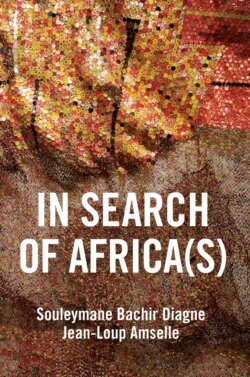In Search of Africa(s)

Реклама. ООО «ЛитРес», ИНН: 7719571260.
Оглавление
Souleymane Bachir Diagne. In Search of Africa(s)
CONTENTS
Guide
Pages
In Search of Africa(s) Universalism and Decolonial Thought
Foreword In focus: a comparative reading of Souleymane Bachir Diagne and Jean-Loup Amselle
Seeing double
Looking through cultural spectacles
Convergences
Souleymane Bachir Diagne: a philosophy of translation
Jean-Loup Amselle: an uncompromising anthropology
From one dialogue to another
Notes
Introduction
Notes
1 Universalism in questions
Notes
2 On the universal and universalism
Notes
3 Race, culture, identity
Merleau-Ponty
Class and identity
First phase:Notebook of a Return to My Native Land(1939)
Second phase: theDiscourse on Colonialism(1950)
Third phase: the letter to Maurice Thorez (1956)
Philosophy and anthropology
Universalism as a matrix
Notes
4 Africanity, Afrocentrism, representation
Notes
5 The racial ban on representation
Exhibit B
Rumour
Deconstructing race and (skin) colour
Notes
6 On cultural and linguistic specificities
The non-existence of language(s)
The reversal of the linguistic stigma
For a geopolitics of languages
Notes
7 On African languages and translation
Notes
8 An optimism of translation
Notes
9 On philosophy in Islam and on the question of a ‘West African Islam’
What led me to write about Islam
Falsafain general and the philosophy of Muhammad Iqbal in particular
Islam: the West African heritage
The ‘Sufi preference’?
Notes
10 The political instrumentalization of a West African Sufi Islam
West African Sufi Islam and ‘Black Islam’
Notes
11 West African Sufism revisited
12 Thinking/creating Africa
Notes
13 On the non-existence of Africa … and of Europe
African diaspora/Black Atlantic
African diaspora and the sixth region of Africa
Thinking/creating Africa
Notes
14 On Africa and pan-Africanism
Notes
15 Souleymane Bachir Diagne’s ‘desire for Africa’
Notes
16 Were human rights born in Africa?
Act One
Act Two
Act Three: Souleymane Kanté and N’Ko
Act Four: the Kankan meeting (1998)
The aftermath of the Kankan meeting: ‘Charter of Kurukan Fuga’ or ‘Charter of the Mandé’?
Notes
17 On the charters of the Mandé
Addendum on the ‘Charter of the Mandé’ and the ‘Hunters’ Oath’
Notes
18 On various contemporary questions
White privilege, Whiteness, anti-White racism
Intersectionality and universalism
Cultural appropriation
Non-diversity and communitarianism
State racism or racism in the state?
Notes
Bibliography. Works by Souleymane Bachir Diagne. Books
Articles cited
Works by Jean-Loup Amselle. Books
Articles cited
POLITY END USER LICENSE AGREEMENT
Отрывок из книги
Souleymane Bachir Diagne and Jean-Loup Amselle
Translated by Andrew Brown
.....
Whenever he talks about Boole, Diagne reminds us, following Descartes, for example, that algebra came to Europeans via the mediation of the Arab world, so we need to constantly bear in mind the existence of other traditions of thought that make similar demands on rationality. All things being equal, and as if in a spirit of symmetry, Diagne stresses that the act of philosophizing as it developed in the Muslim cultural world itself came largely from the thinkers of ancient Greece with whom Arab and Persian thinkers entered into dialogue by translating their works. This dialogue was pursued in other Muslim areas: the Indian thinker Muhammad Iqbal, for instance, engaged in a veritable philosophical conversation with the works of European philosophers such as Friedrich Nietzsche and Henri Bergson.
Translation, of course, involves written traditions, and inevitable shifts of emphasis. Diagne looks back at the different intellectual disciplines that filled the shelves of the Islamic library, and focuses on three discursive practices: rational theology (kalam), philosophy (falsafa) and Sufism (tasawwuf). In his view, philosophical reflection goes beyond the limits of falsafa alone in order to manifest itself in other discourses, or even other human practices, such as art. This means that two additional dimensions become important for him.
.....